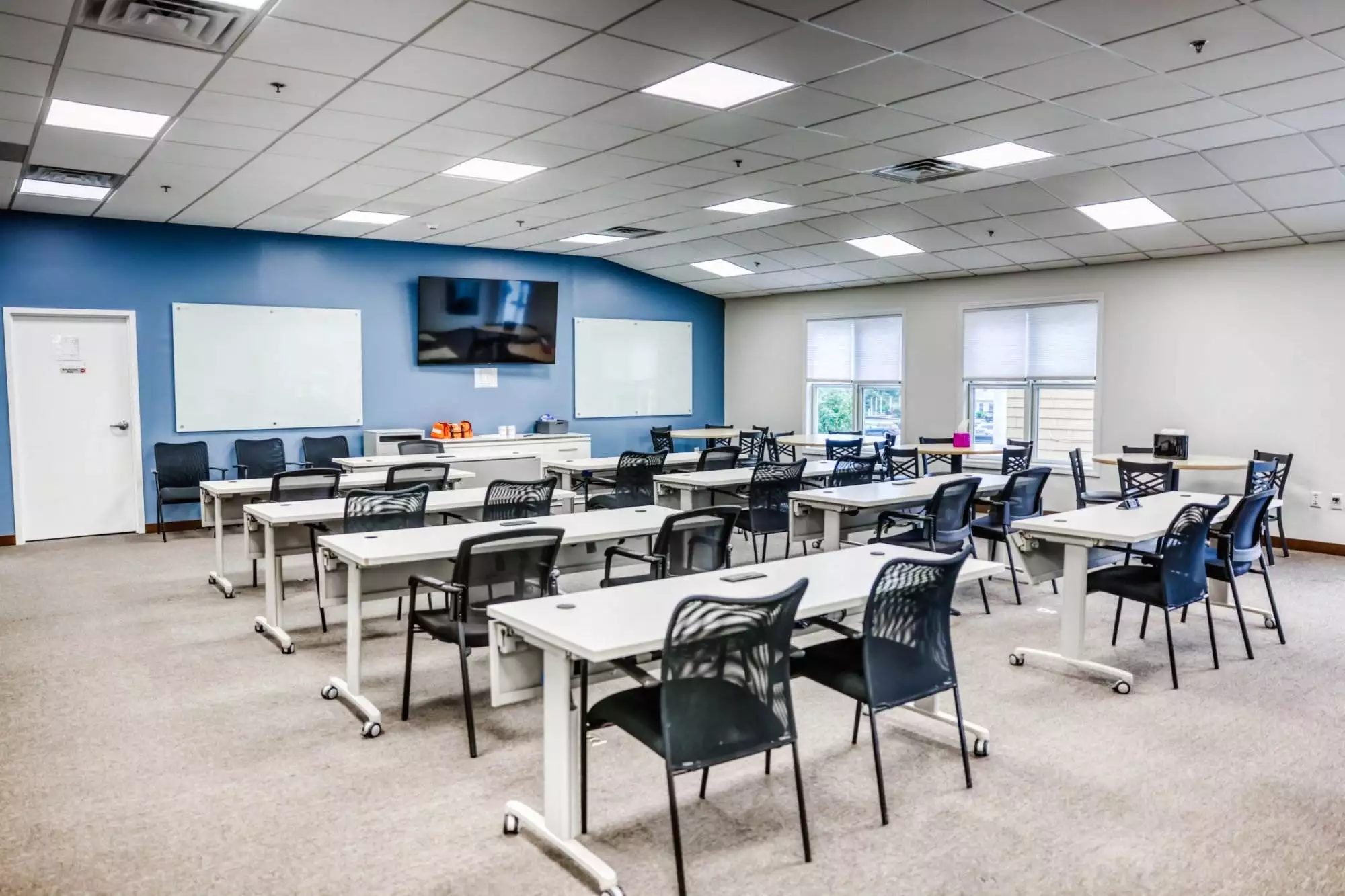Levels of Care on Cape Cod
Navigating mental health treatment can feel overwhelming, but you don’t have to be an expert to get the support you deserve. The Foundations Group Behavioral Health team on Cape Cod, MA will help you find the best level of care for your needs.

What Are the Levels of Behavioral Health Care?
Behavioral health care encompasses a continuum of services, ranging from intensive inpatient treatment to less intensive outpatient support. This continuum is designed to provide the appropriate level of care based on an individual’s unique needs, symptom severity, and ability to function independently.
At the highest level, inpatient hospitalization offers 24/7 monitoring and stabilization for those experiencing a severe psychiatric crisis or who may be at risk of harming themselves or others. Residential treatment programs provide a supportive, community-like environment for individuals who require a highly structured setting to focus on long-term recovery.
Other Services
Levels of Care at Foundations Group in Cape Cod, MA
Healing happens in stages and finding the right level of support can make all the difference. At Foundations Group Behavioral Health, we offer three levels of care tailored to your unique needs:
These three types of care qualify as “lower levels of care.” This tier of mental health care refers to structured outpatient programs designed to provide mental health support without requiring overnight stays. Unlike inpatient care or medical detox, these programs allow individuals to receive treatment while continuing to live at home and manage daily responsibilities. However, there is a varying degree of support and intensity even within this bracket of care.
Psychiatric Day Treatment Program
Our Psychiatric Day Treatment Program provides structured and intensive therapeutic services for individuals requiring more support than traditional outpatient care but not requiring 24-hour inpatient services. Clients participate in a full day of therapeutic activities, including group therapy, individual counseling, medication management, and skill-building exercises to address their mental health challenges in a supportive environment.
Half Day Treatment Outpatient Program
Our Half Day Treatment Outpatient Program is designed for individuals with severe mental health conditions who require a higher level of care than traditional outpatient services, but do not need a full day of programming. This program offers personalized therapy, medication management, and group sessions to help clients address their mental health needs while allowing them to continue living at home and remain engaged in their daily lives.
Outpatient Mental Health Program
Our Outpatient Mental Health Program is tailored for individuals seeking ongoing support for their mental health concerns. This program offers individual counseling, group therapy, medication management, and holistic approaches to promote mental well-being. Clients can access our services on a regular basis to receive the necessary support and guidance to improve their mental health and overall quality of life.

What level of care is right for me?
Choosing the right level of care depends on the severity of your symptoms, your ability to manage daily responsibilities, and the type of support you need. Use the criteria below to help guide your decision:
Psychiatric Day Treatment Program (Full-Day Program)
This level of care may be best for you if:
- You experience significant mental health challenges that interfere with daily life.
- You require intensive therapeutic support but do not need 24/7 inpatient care.
- You struggle with emotional regulation, severe anxiety, depression, or mood instability.
- You need structured, full-day therapy with access to multiple therapeutic modalities.
- You benefit from a highly supportive, immersive treatment environment.
Half-Day Treatment Program
Consider this level of care if:
- You need structured support but don’t require a full-day program.
- You have moderate mental health concerns that impact your daily life.
- You are transitioning from a more intensive program and need continued therapeutic support.
- You require therapy but need flexibility to manage work, school, or family obligations.
- You would benefit from a combination of group and individual therapy in a shorter format.
Outpatient Mental Health Program
This level of care may be the right fit if:
- You need ongoing mental health support but do not require a structured daily or half-day program.
- You can manage daily responsibilities while attending therapy sessions as needed.
- You are stepping down from a higher level of care and want to maintain progress.
- You are looking for individual or group therapy with psychiatric support.
- You have mild to moderate mental health concerns and want to develop coping skills and long-term strategies.
If you’re unsure which level of care is right for you, that’s okay! We don’t expect you to have all the answers. Reach out to our team and we’ll find the right size program for you. Feeling better is just a phone call away.
FAQ: Your questions, answered.
Do I need to go to inpatient before entering intensive outpatient care?
No. Levels of care exist to meet you where you are. While some individuals start with inpatient care and transition to outpatient programs, many begin treatment at an outpatient level, depending on their symptoms and daily responsibilities. Our team will assess your needs and recommend the right starting point for you.
How long will I stay at each level of care?
The duration of treatment depends on your individual progress, mental health needs, and goals. Some clients stay in a program for a few weeks, while others may benefit from several months of support. We’ll work with you to create a personalized treatment plan and regularly assess your progress to ensure you’re receiving the right level of care.
What happens when I “graduate” a level of care?
When you’re ready to transition to a lower level of care, we create a personalized discharge plan that includes continued therapy, medication management (if needed), and resources to help you maintain progress. Whether stepping down from psychiatric day treatment to outpatient therapy or completing the program altogether, we ensure you have a solid support system in place.
Will I see the same clinicians throughout my treatment?
We prioritize continuity of care. While you may work with multiple specialists depending on your treatment needs, we strive to provide a consistent team that understands your history and goals. Your primary therapist and psychiatric providers will remain involved in your care, even as you transition between levels of treatment.
Does family get involved in treatment?
Yes, if you’d like them to be. Family support can play a vital role in recovery. We offer family therapy sessions and psychoeducation to help loved ones better understand mental health challenges and learn how to provide effective support. Participation is always voluntary and based on your comfort level.
What if I start treatment and realize I need a higher or lower level of care?
That’s completely okay. Mental health treatment is not one-size-fits-all, and we regularly assess whether you’re in the right program. If we determine that you need a different level of support, we’ll help transition you to the appropriate care—whether that means stepping up to a more intensive program or stepping down as you progress.
What insurance do you accept?
We accept most major insurance providers and offer flexible payment options. Our admissions team can verify your benefits and help you understand your coverage before starting treatment. If you have concerns about affordability, reach out to discuss financing options.
What if I’m unsure which level of care is right for me?
That’s completely normal. You don’t have to make this decision alone. Our clinical team is here to guide you through an assessment and recommend the best fit based on your symptoms, goals, and lifestyle needs. Help is just a phone call away.
Key Components of a Successful Behavioral Health Care Program Across Levels of Care
When facing a mental health challenge, it’s important to know you have options for support and healing. There are various types of professional help available to guide you through recovery. Here are three main approaches:
Psychotherapy
Psychotherapy is one of the most effective treatments for mental health conditions. It involves working with a licensed mental health professional to explore your thoughts, emotions, and behaviors in a structured setting. Through this process, you’ll gain valuable insights and develop coping strategies tailored to your unique needs.
Therapy can take different forms, depending on your symptoms and goals. Some of the most common approaches include:
- Cognitive Behavioral Therapy (CBT): Helps identify and change negative thought patterns and behaviors.
- Dialectical Behavior Therapy (DBT): Focuses on emotional regulation, distress tolerance, and interpersonal effectiveness.
- Interpersonal Therapy (IPT): Addresses relationship dynamics and how they affect mental well-being.
Your therapist will work with you to determine the best therapeutic approach and adjust your treatment plan as needed.
Medication Management
While medication alone doesn’t cure mental illness, it can be a vital part of treatment when used alongside psychotherapy. Medications such as antidepressants, antipsychotics, and mood stabilizers help regulate brain chemistry and alleviate symptoms of conditions like depression, anxiety, bipolar disorder, and schizophrenia.
Our psychiatric professionals take a collaborative, individualized approach to medication management, which includes:
- A comprehensive evaluation to determine the most appropriate medication and dosage.
- Regular follow-ups to monitor effectiveness and adjust prescriptions as needed.
- Education on potential side effects and how to manage them.
- Ongoing coordination with therapists and healthcare providers to ensure holistic care.
Individual and Group Therapy
Individual and group therapy provide a safe, structured environment where individuals can process emotions, develop coping skills, and receive professional guidance.
- Individual Therapy: One-on-one sessions with a therapist allow for personalized treatment tailored to your specific mental health needs. This approach helps you explore challenges in depth, identify thought patterns, and develop practical strategies for managing symptoms.
- Group Therapy: In a group setting, participants connect with others facing similar struggles, gaining encouragement, shared perspectives, and valuable support. Group therapy fosters a sense of community and belonging, which can be instrumental in the healing process.
Many clients find that a combination of individual and group therapy provides well-rounded support, addressing both personal and social aspects of mental health.
Psychoeducation & Skill-Building
Understanding your mental health condition is a crucial step in the healing process. Our psychoeducation and skill-building workshops are designed to help you:
- Recognize symptoms and triggers.
- Develop healthy coping mechanisms for managing stress, anxiety, and emotional distress.
- Improve communication and relationship skills to foster healthier interactions.
- Strengthen problem-solving and decision-making abilities.
- Build emotional resilience to navigate life’s challenges more effectively.
These sessions combine education with practical exercises, empowering clients to take an active role in their recovery.
What to Expect in Behavioral Health Treatment
- Compassionate Intake Process . From day one, you’ll be welcomed into a supportive environment focused on your well-being. Our intake team conducts a thorough evaluation to understand your mental health history, current symptoms, and goals. This personalized approach ensures you receive the right level of care in a safe and empathetic setting.
- Structured Daily Routine. Your treatment plan includes a balanced mix of individual and group therapy, therapeutic activities, and self-care. Our evidence-based methods—such as cognitive behavioral therapy and mindfulness—help build coping skills, while peer connections foster a supportive community.
- Comprehensive Transition Planning. As you progress, we’ll create a plan to help you smoothly reintegrate into daily life. This includes follow-up care, support networks, and practical strategies to maintain your progress. Our goal is to equip you with confidence, resilience, and lasting tools for wellness.

The right care changes everything.
If you’re ready to take the next step toward healing, our team is here to guide you. Call a professional at Foundations Group Behavioral Health today to explore your options and begin your journey to wellness.
Psychiatric Day Treatment Program
Half Day Treatment Program
Outpatient Mental Health Program
Verify Insurance

